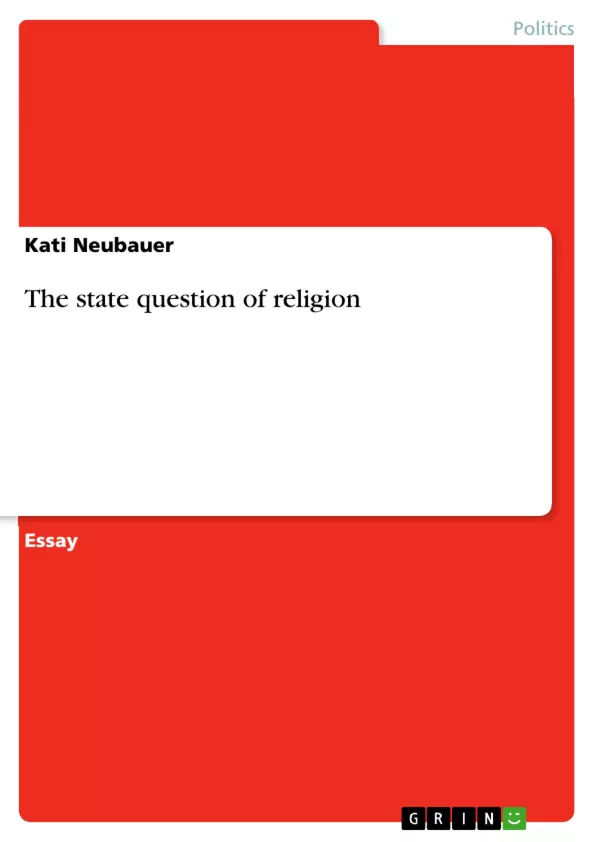In the modern Middle East, political questions often seem to be tied closely to religious concerns. This occurs especially in the development of independent states in the 20th century, when capable and strong governments had to be formed. The question how to in- or exclude religions from the government and political affairs is a hot topic, and displays a huge influence of religion even on the state structures. The essay does discuss what impact the question on religion has on certain modern Middle Eastern states. Therefore, a comparison between Iran, Israel, and Lebanon is made.
Inhaltsverzeichnis (Table of Contents)
- The state question of religion
- Iran
- Israel
- Lebanon
Zielsetzung und Themenschwerpunkte (Objectives and Key Themes)
This essay examines the impact of religion on the state structures of three modern Middle Eastern countries: Iran, Israel, and Lebanon. The author explores how religious concerns have shaped the development of these states and the challenges they face in balancing religious and secular values.- The role of religion in the formation of independent states in the Middle East
- The relationship between religion and state governance in various contexts
- The challenges of religious pluralism and the potential for conflict
- The influence of religious beliefs and practices on state institutions and laws
- The impact of religious identity on political participation and social dynamics
Zusammenfassung der Kapitel (Chapter Summaries)
Iran
The essay begins by examining the case of Iran, highlighting the tension between secularization and religious revivalism in the country. The author describes how the Shah's attempts to modernize and secularize Iran led to a backlash from religious groups, culminating in the Islamic Revolution of 1979. The revolution established an Islamic Republic based on Shiite Islam, with religious leaders wielding significant political power. The essay discusses the implementation of Sharia law, the impact of religious ideology on social life, and the challenges faced by the Islamic Republic in balancing religious and secular interests.Israel
The essay then turns to the case of Israel, examining the complex relationship between religion and state in a country founded on Jewish religious beliefs. The author notes the challenges faced by Israel in defining Jewish identity as either religious or ethnic, and the implications of this definition for the state's relationship with its Arab citizens. The essay explores the role of religious courts in personal law, the influence of Jewish holidays and dietary laws on public life, and the tensions between different Jewish religious traditions. The author also discusses the potential for religious conflict with neighboring Arab states.Lebanon
Finally, the essay explores the case of Lebanon, which adopts a more nuanced approach to religious pluralism. The author describes Lebanon's unique system of sharing power among different religious groups, with the aim of minimizing religious suppression and conflict. However, the essay also acknowledges the potential for instability caused by competition between different religious groups, and the challenges of balancing religious representation with effective governance.Schlüsselwörter (Keywords)
The essay focuses on the intersection of religion and politics in the modern Middle East. Key concepts include state formation, secularization, religious revivalism, Islamic Republic, Sharia law, religious pluralism, religious conflict, political representation, and identity politics.Frequently Asked Questions
How does religion influence state structures in the Middle East?
Religion plays a significant role in state formation, governance, and law, often shaping national identity and political participation in countries like Iran, Israel, and Lebanon.
What is the relationship between religion and state in Iran?
Since the 1979 Revolution, Iran has been an Islamic Republic where Shiite religious leaders hold significant political power and Sharia law is implemented.
How does Israel balance secular and religious values?
Israel faces challenges defining Jewish identity as ethnic or religious, with religious courts influencing personal law and Jewish traditions impacting public life.
What is unique about Lebanon's political system regarding religion?
Lebanon uses a power-sharing system among different religious groups to minimize suppression, though this often leads to political instability and competition.
What are the challenges of religious pluralism in the region?
The main challenges include potential for conflict between traditions, balancing religious representation with effective governance, and managing identity politics.
- Quote paper
- Kati Neubauer (Author), 2008, The state question of religion, Munich, GRIN Verlag, https://www.grin.com/document/133393



